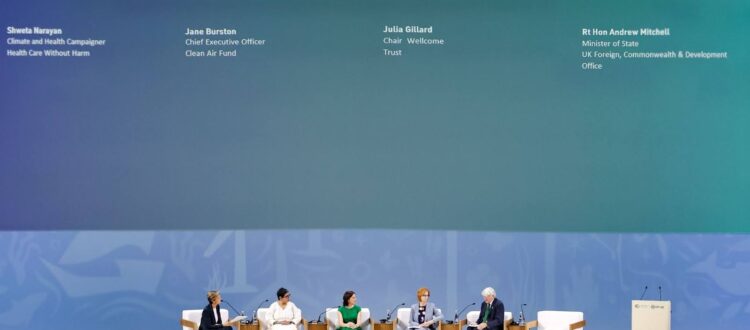HEALTH ENTERS THE AGENDA AT COP28, BUT THERE IS STILL MUCH TO DO
- Health enters the agenda at COP28 with the first “Declaration on climate and health”, which establishes the political commitment of more than 120 countries.
- The first Health Day at a climate COP mobilized more than $1 billion in funding.
- This is a historic step, but it is essential that political commitment gets translated into concrete action by immediately introducing health into the negotiation processes.
At COP28, health entered the agenda of the United Nations’ climate conferences for the first time.
The COP28 Presidency and the World Health Organization (WHO), in collaboration with the Ministry of Health and Prevention of the United Arab Emirates (UAE), have announced the “UAE Declaration on Climate and Health”. Endorsed by more than 120 countries, the declaration is the first to recognize the growing impact of climate change on health, and the need for governments to protect communities and prepare health systems to deal with impacts such as extreme heat, air pollution and infectious diseases(1).
The Declaration was announced at the beginning of the first Health Day ever organized by a COP on climate, which also hosted the first Ministerial focused on health and climate this year.
Despite the historical importance of the Declaration on climate and health, which establishes the political commitment of governments to incorporate the issue of health into their climate agenda, the text does not mention the abandonment of fossil fuels nor their role in causing those phenomena – linked to climate change – which weigh heavily on people’s health (including heat waves, air pollution, drought, extreme weather events and the spread of infectious diseases).
Sadly symbolic is the fact that, on the first health day in the history of the climate COP, a blanket of smog obscured the skyline of Dubai. According to WAQI.info, which reports air quality data from more than 10’000 stations around the world, the air quality index for PM2.5 particulate matter in Dubai has reached a value classified as “unhealthy” according to a scale based on the US EPA(2) standard.
Financially, health programs have historically been at the bottom of the list in the allocation of climate funds: only 2% of adaptation finance and 0.5% of multilateral climate finance have been awarded to projects aimed at protecting or improving human health(3).
COP28 also noted important progress on this, with the announcement, among others, of funding from a wide range of partners including governments, development banks, multilateral institutions, philanthropic organizations and NGOs to expand their investments for climate and health solutions.
In total, the announced financial commitment exceeded the $1 billion threshold, with the aim of addressing the growing needs of the climate and health crisis in support of the political commitments made by the signatory nations.
The first Health Day at COP28 is undoubtedly a historic step, which gives visibility to crucial issues such as the resilience of health systems and the reduction of their ecological footprint, the importance of involving vulnerable communities and the need for financing. However, it is essential that political commitment gets translated into action, immediately introducing health into the negotiation processes.
Article by Annalisa Barozzi, volunteer of the Italian Climate Network
(1) www.cop28.com
(2) World’s Air Pollution: Real-time Air Quality Index (waqi.info)
(2) www.who.int

